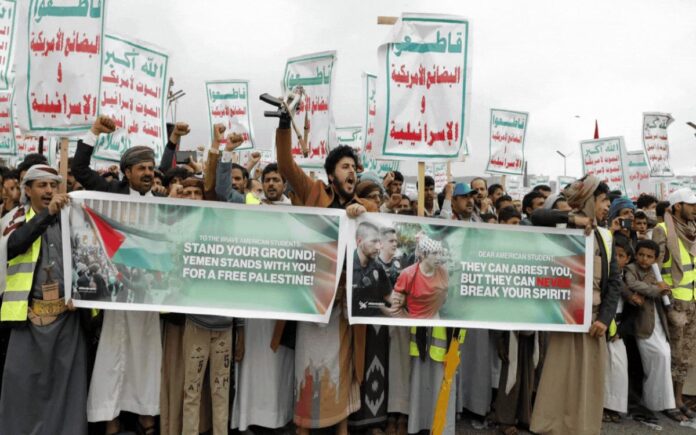Sana’a: In a surprising turn of events, the Iran-aligned Houthi rebels in Yemen, known for their staunch solidarity with Palestinians during the Gaza conflict, are offering sanctuary to American students expelled from universities in the US for their pro-Palestinian stance.
Amid ongoing protests across multiple US campuses against Israel’s actions in Gaza, which have persisted for seven months, students are rallying for President Joe Biden to take decisive measures to halt the violence. They’re also advocating for schools to divest from companies supporting the Israeli government’s policies.
In response to these demonstrations, institutions like Columbia University in New York City have resorted to deploying police forces to quell the protests.
“We are serious about welcoming students that have been suspended from US universities for supporting Palestinians” remarked an official from Sanaa University, under Houthi control, speaking to Reuters. “We are fighting this battle with Palestine in every way we can.”
Also Read | Iranian Director Mohammad Rasoulof Barred from Cannes 2024 Amid Government Restrictions
Sanaa University Praises ‘Humanitarian’ Acts
Sanaa University released a statement applauding the “humanitarian” actions of American students and extended an invitation for them to continue their education in Yemen.
“The board of the university condemns what academics and students of US and European universities are being subjected to, suppression of freedom of expression,” declared the university board in a statement, providing contact details for interested students.
This year, both the US and UK reinstated the Houthi militia on their list of terrorist organizations due to their attacks on vessels in the Red Sea, which have had far-reaching economic repercussions.
The Houthi rebels’ offer to accommodate US students received mixed reactions from Yemenis on social media, with some expressing cynicism through humor. One user shared an image depicting Westerners chewing qat, a popular narcotic leaf in Yemen, humorously likening it to American students during their potential tenure at Sanaa University.



